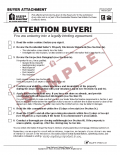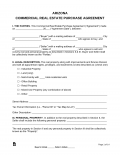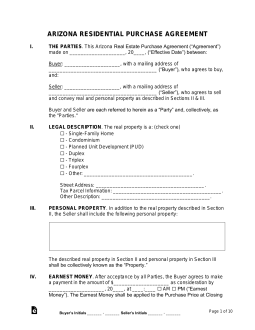Updated April 15, 2024
An Arizona residential real estate purchase and sale agreement is a legal document with terms and conditions for a buyer’s purchase of property from a seller. The seller and buyer (or their attorneys) will negotiate the terms of the agreement including purchase price, closing date, property condition, and so on. Typically, the buyer will be required to make a deposit, or ”earnest money,” to ensure the seller that they are serious about the transaction. Once inspections have been made, financing is in place (if applicable) and all other contingencies have been met, the parties can sign the purchase and sale agreement to finalize the deal.
Buyer Inquiry – The seller is only required to disclose material information about the property; however, if a buyer makes an inquiry regarding a particular aspect of the property, the seller must disclose any and all information pertaining to said aspect.[1]
Table of Contents |
Realtor Version
 Arizona Assoc. of Realtors – PDF (Sample)
Arizona Assoc. of Realtors – PDF (Sample)
Required Disclosures (7)
Comprehensive Loss Underwriting Exchange (C.L.U.E.) – The seller must provide the buyer with a report containing a list of any claims made on the property. Federal and State laws regulate how personal information is handled by the insurance industry and sellers must avoid violating these regulations. A seller can access their C.L.U.E. through LexisNexis (Consumer Portal). The parties can also waive their rights through a waiver form.
Condominium Disclosure – Applicable to a property sold within a homeowner’s association or condominium/planned community.[2]
Lead-Based Paint Disclosure – Applicable to residences that were built prior to 1978.
*Property Disclosure Statement – The seller must disclose what they know in regard to the property’s condition and known problems. Although this isn’t the only disclosure form accepted by the State, it is the most commonly used. (Adobe PDF, MS Word or ODT). A seller can also use the Assoc. of Realtors Property Disclosure Statement.[3]
- *Not Required to Disclose – The seller is not required to disclose if the property was (1) the location of natural death, suicide, homicide, or any other crime classified as a felony, (2) owned or occupied by an individual with the human immunodeficiency virus or diagnosed as having the acquired the immune deficiency syndrome or any other disease that is not known to be transmitted through common occupancy of real estate, and (3) located in the vicinity of a sex offender.[4]
Soil Remediation Disclosure – The buyer must be notified if the property has been subject to soil remediation. This can be mentioned in the Property Disclosure Statement.[5]
Swimming Pool Disclosure – The sale of a property with a pool requires the seller to provide this department of health services notice to the buyer.[6]
Unincorporated Area Disclosure – A special disclosure form applicable to sellers of property (five or fewer parcels) on unincorporated land.[7]
Commercial Property
 Commercial Purchase Agreement – Between a buyer and seller to transact commercial property.
Commercial Purchase Agreement – Between a buyer and seller to transact commercial property.
Download: PDF, MS Word, OpenDocument


